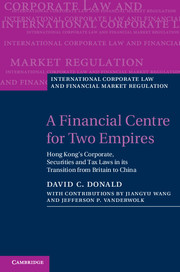 A Financial Centre for Two Empires
A Financial Centre for Two Empires The corporate control context
Published online by Cambridge University Press: 05 June 2014
The dominance of substantial shareholders
The history of Hong Kong discussed in Chapter 1 has cut a path of development in which private ordering by both British and Chinese merchants greatly controlled the shape of the Hong Kong economy, society and government, which left the regulatory actions and interventions of government minimal. It has also been a history of providing services outward towards foreign partners, both in trade and in finance, first in the context of the British Empire and later within the Chinese economy. Britain and the Commonwealth were the sources for the development of much of Hong Kong’s common law, meaning that the doctrines and principles found in this body of law are not always well adapted to the local circumstances of Hong Kong. While this relationship is no longer binding post-1997, the path dependence of Hong Kong’s history is very strong in this regard. On the other hand, the relationship with China has been a constant in Hong Kong’s history that varied in shape and intensity as a factor of the state of political affairs in China. At times Hong Kong has thrived from its relationship with China and at other times it has thrived because China chose to implement policies that crippled its productive capacity and engagement in international trade, such as during the third quarter of the twentieth century when Hong Kong (together with Taiwan) briefly became China’s ersatz manufacturing hub.We thus understand that the Region called Hong Kong presents a very complex phenomenon – absorbing and adapting British institutions while reacting and adjusting itself in relation to China’s, Asia’s and indeed global developments.
To save this book to your Kindle, first ensure [email protected] is added to your Approved Personal Document E-mail List under your Personal Document Settings on the Manage Your Content and Devices page of your Amazon account. Then enter the ‘name’ part of your Kindle email address below. Find out more about saving to your Kindle.
Note you can select to save to either the @free.kindle.com or @kindle.com variations. ‘@free.kindle.com’ emails are free but can only be saved to your device when it is connected to wi-fi. ‘@kindle.com’ emails can be delivered even when you are not connected to wi-fi, but note that service fees apply.
Find out more about the Kindle Personal Document Service.
To save content items to your account, please confirm that you agree to abide by our usage policies. If this is the first time you use this feature, you will be asked to authorise Cambridge Core to connect with your account. Find out more about saving content to Dropbox.
To save content items to your account, please confirm that you agree to abide by our usage policies. If this is the first time you use this feature, you will be asked to authorise Cambridge Core to connect with your account. Find out more about saving content to Google Drive.